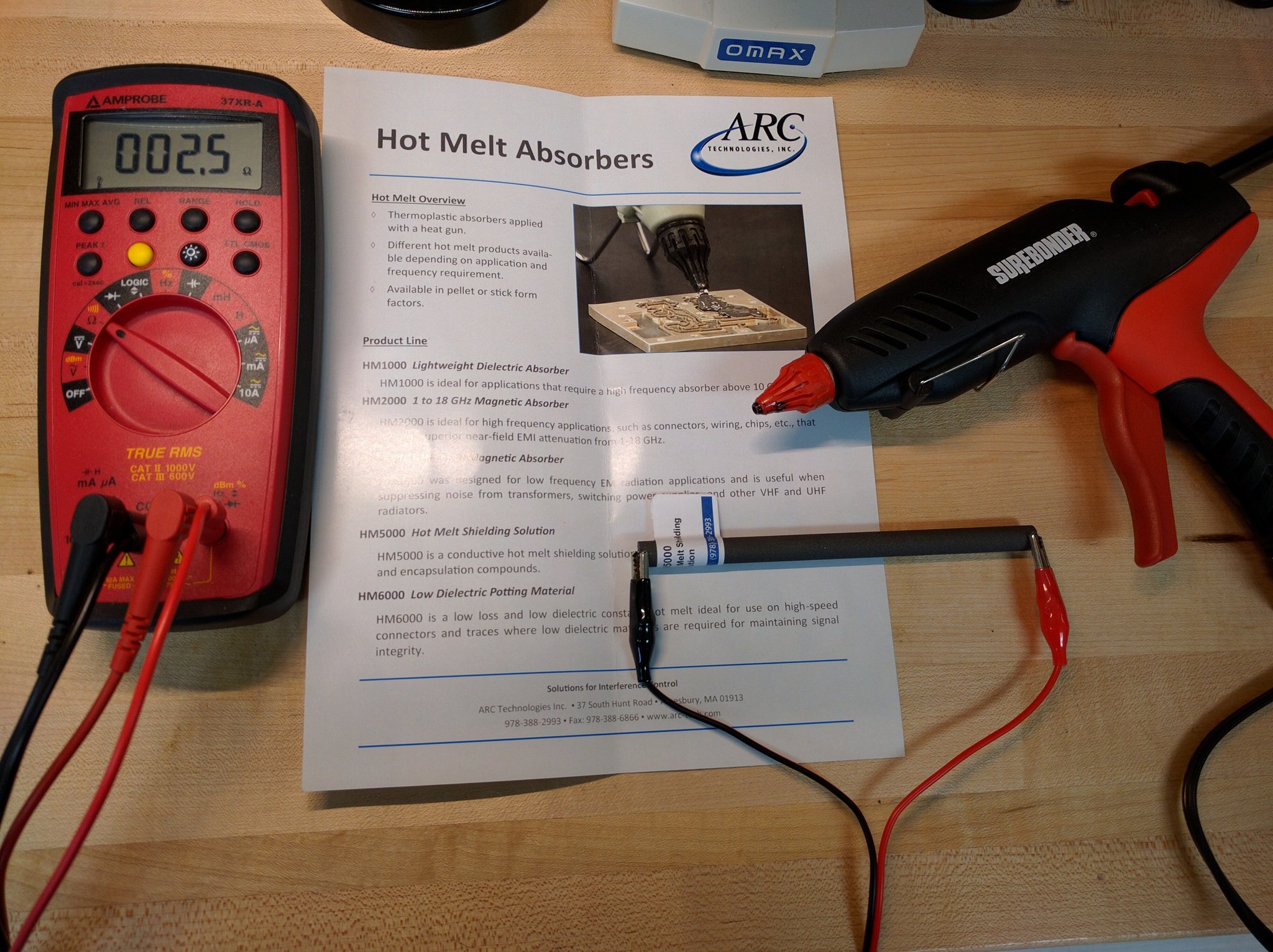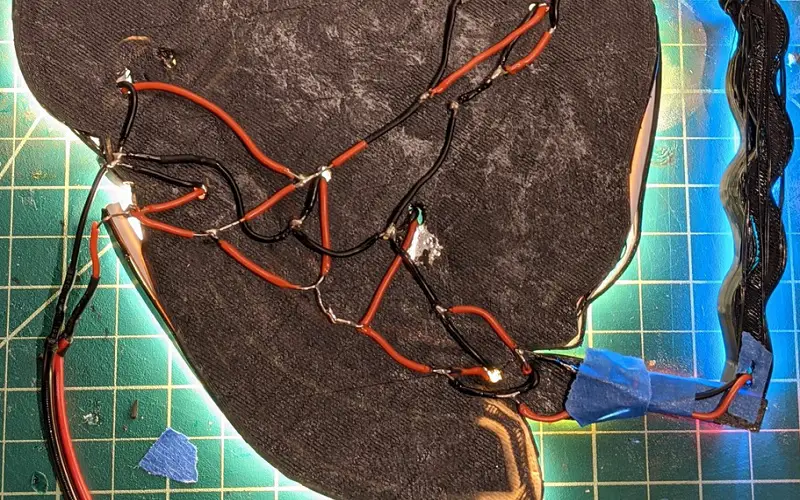Hot glue is not conductive; it does not allow the flow of electricity through it. However, hot glue can be used for various non-conductive applications in crafting and DIY projects.
Its adhesive properties make it a versatile material for bonding different surfaces together. Whether you are creating handmade decorations or repairing household items, hot glue can be a handy tool to have in your toolkit.
Despite not being conductive, hot glue offers a quick and easy way to secure objects in place without the need for specialized equipment. Let’s explore the uses and limitations of hot glue in more detail.
Contents
Introduction To Hot Glue In Electronics
Hot glue, known for its versatility and ease of use, has found its way into the realm of electronics as a valuable tool for hobbyists and professionals alike.
This adhesive, typically used for bonding and sealing, has proven to be a valuable asset in electronics projects due to its insulating properties and ease of application.
Common Uses
Hot glue is commonly used in electronics for securing components, encapsulating small circuitry, and strain relief for wire connections. Its ability to provide a secure hold and protect delicate electronic parts makes it a popular choice for both prototyping and final project assembly.
Why The Question Of Conductivity?
The conductivity of hot glue in electronics is a topic of interest due to its potential impact on the performance and safety of electronic devices. Understanding whether hot glue is conductive is crucial for ensuring the reliability and functionality of electronic components and circuits.

The Nature Of Hot Glue
Composition
Hot glue, also known as hot melt adhesive, is a thermoplastic adhesive commonly available in stick form for use with a hot glue gun. It is composed primarily of ethylene-vinyl acetate (EVA) or polyethylene, with various additives such as wax, tackifiers, and antioxidants to modify its properties.
Properties
Hot glue is known for its quick setting time and strong bonding properties. It melts and flows when heated, creating a bond as it cools and solidifies. It is often used for bonding materials such as wood, plastic, fabric, and foam. However, one question that arises is whether hot glue is conductive.
Conductivity Explained
Hot glue is not conductive because it contains an insulating material. While it’s a great adhesive, it doesn’t allow electricity to flow through it. When working on electronic projects, it’s important to use conductive materials to avoid any disruptions in the electrical flow.
How Materials Are Classified?
Conductivity Explained: Conductivity refers to how well a material allows the flow of electricity. Different materials are classified based on their ability to conduct electricity. Metals are excellent conductors due to their free-flowing electrons.
Insulators, on the other hand, do not conduct electricity well. Semiconductors fall in between. Conductivity is measured in Siemens per meter (S/m).
The higher the conductivity, the better the material conducts electricity. Temperature and impurities can affect a material’s conductivity. Hot glue is not conductive as it lacks the free electrons necessary for electricity flow.
Investigating Hot Glue Conductivity
Investigating the conductivity of hot glue reveals its potential as a conductive material. This research explores whether hot glue can be used for electrical connections and highlights its conductivity properties.
Investigating Hot Glue Conductivity Hot glue is a versatile adhesive that is commonly used for various DIY projects. But have you ever wondered if hot glue is conductive? In this blog post, we will explore the conductivity of hot glue and conduct a series of experiments to investigate its electrical properties.
Let’s dive in and uncover the truth about hot glue conductivity. Experimental Setups To determine the conductivity of hot glue, we set up a series of experiments using different materials and configurations.
We used a multimeter to measure the resistance of the hot glue samples and compared the results with known conductive and insulating materials.
The following setups were employed:
1. Simple Circuit Setup:
- We created a basic circuit using a battery, an LED, and wires.
- Hot glue samples were placed in the circuit to complete the connection.
- By observing the behavior of the LED, we could determine if the hot glue was conductive or not.
2. Resistance Measurement:
- We measured the resistance of hot glue samples using a multimeter.
- The resistance values were compared with known conductive and insulating materials to gauge the conductivity of hot glue. Results Interpretation After conducting the experiments, we analyzed the results to interpret the conductivity of hot glue.
Here’s what we found:
1. Simple Circuit Setup Results:
- When hot glue was used to complete the circuit, the LED did not light up.
- This indicated that hot glue does not conduct electricity effectively in a simple circuit.
2. Resistance Measurement Results:
- The resistance values of hot glue were significantly higher compared to known conductive materials such as copper or aluminum.
- This suggests that hot glue has poor conductivity and can be considered as an insulator rather than a conductor. In conclusion, our experiments demonstrate that hot glue is not conductive and should not be relied upon for electrical connections.
It is important to use proper conductive materials when working with electricity to ensure safe and reliable results. Remember, always prioritize safety and use appropriate materials for your electrical projects.
Myths Surrounding Hot Glue
There is a common myth that hot glue is conductive, but this is not true. Hot glue is actually an insulator and does not conduct electricity. This is important to keep in mind when working on projects that involve electronics.
Origin Of Myths
Hot glue is a versatile adhesive that can be used for a variety of projects and materials. However, many myths surround its use, particularly regarding its conductivity. These myths may have originated from a misunderstanding of the properties of hot glue and its behavior under certain conditions.
Popular Myths Debunked
One of the most common myths surrounding hot glue is that it is conductive. This myth likely stems from the fact that hot glue is made from thermoplastics, which can have conductive properties. However, once the glue cools and solidifies, it becomes an insulator and loses any conductive properties it may have had.
Another myth is that hot glue can be used to repair or create electrical circuits. While hot glue can be used to hold components in place, it cannot conduct electricity and should not be relied upon to make electrical connections.
Some people also believe that hot glue can be used to create a waterproof seal. While hot glue is water-resistant and can be used in humid environments, it is not a reliable sealant for applications that require a waterproof barrier.
Finally, some people believe that hot glue is toxic and should not be used for certain applications. While it is true that hot glue can emit fumes when heated, these fumes are generally not harmful in small quantities. However, it is always a good idea to use hot glue in a well-ventilated area to minimize the risk of exposure to fumes.

Comparing Hot Glue To Other Adhesives
When it comes to finding the right adhesive for your electrical projects, it’s important to consider the conductivity of the glue. Hot glue is a popular choice for many craft projects, but is it conductive? Let’s take a closer look at hot glue and compare it to other common adhesives used in electrical applications.
Electrical Tape
Electrical tape is a widely used adhesive for electrical insulation and bundling. It is made of a thin, flexible material that can conform to irregular surfaces.
While electrical tape is effective in insulating wires and providing mechanical protection, it is not conductive. Therefore, it cannot be used to create electrical connections or repair conductive pathways.
Conductive Epoxy
Conductive epoxy is a specialized adhesive that contains conductive particles, allowing it to create electrical connections. It is commonly used in electronic repairs and circuitry applications.
Unlike hot glue, conductive epoxy provides a reliable and durable conductive pathway. It is highly adhesive and can bond to various materials, making it a suitable choice for projects that require conductivity.
However, it’s important to note that conductive epoxy requires careful handling and precise application. Improper mixing or excessive application can result in poor conductivity or even damage to the electrical components.
On the other hand, hot glue is not conductive by nature. It is primarily used for bonding and securing non-electrical components. While hot glue can provide a strong adhesive bond, it should not be relied upon for creating electrical connections or repairing conductive pathways.
In conclusion, when it comes to electrical projects, it’s crucial to choose the right adhesive for the job. While hot glue is versatile and useful for various crafts, it is not conductive.
If you require conductivity, consider using specialized adhesives like conductive epoxy. Always follow manufacturer guidelines and exercise caution when working with electrical components to ensure safety and effectiveness.
Safe Practices With Hot Glue In Electronics
Precautions
When working with hot glue in electronics, it’s crucial to take certain precautions to ensure safety and prevent damage to the components. Here are some important safety measures to keep in mind:
- Wear protective gloves to avoid burns from the hot glue.
- Work in a well-ventilated area to minimize inhalation of fumes.
- Avoid contact between the hot glue and bare skin to prevent burns.
- Unplug the glue gun when not in use to prevent accidental burns or fires.
Best Practices
Utilizing best practices when using hot glue in electronics can help ensure successful and safe application. Here are some tips to follow:
- Use a low-temperature glue gun to reduce the risk of damaging sensitive electronic components.
- Apply the hot glue sparingly to avoid excessive buildup and potential interference with electrical connections.
- Allow the hot glue to fully cool and solidify before testing the electronic device to prevent any short circuits.
- Regularly inspect the glue gun for any signs of damage or wear to prevent malfunctions during use.
Frequently Asked Questions
Can I Use Hot Glue On A Circuit Board?
Yes, hot glue can be used on a circuit board for non-electrical components as it provides a strong adhesive bond.
However, caution should be exercised to ensure that the hot glue does not come into contact with any electrical connections or sensitive components that may be affected by heat.
Are Hot Glue Sticks Conductive?
No, hot glue sticks are not conductive due to their non-metallic composition. They are insulating materials.
Is Glue Electrically Conductive?
Yes, some glues are electrically conductive due to the presence of metallic particles or additives. These glues can create electrical connections between components.
Is Gorilla Hot Glue Conductive?
No, Gorilla hot glue is not conductive. It is an insulator and does not conduct electricity.
Conclusion
While hot glue is not inherently conductive, it is possible to make it conductive by adding certain materials such as graphite powder or carbon fiber.
However, it is important to note that this conductivity may not be consistent or reliable for certain applications. It is always best to use materials specifically designed for conductivity to ensure safety and effectiveness.

